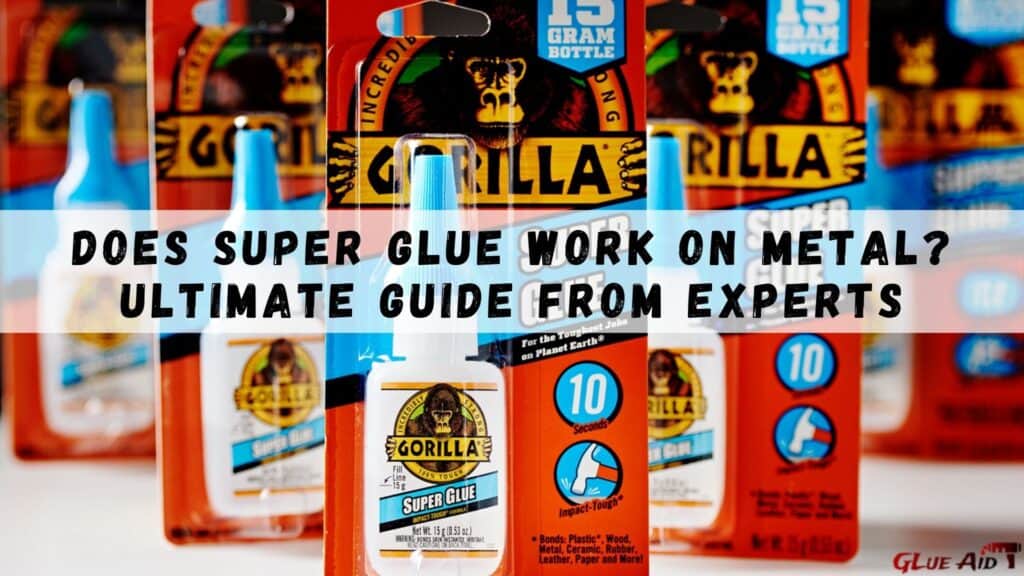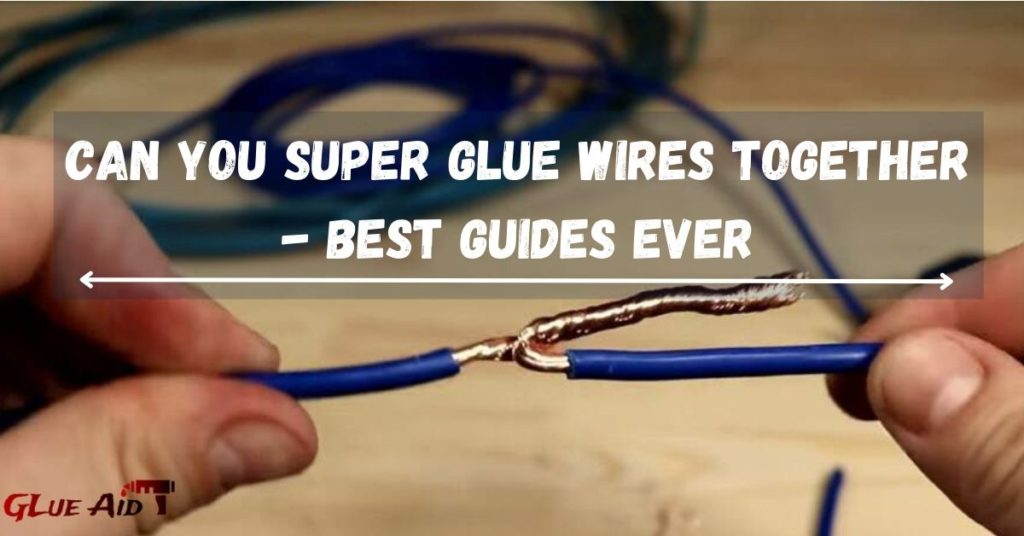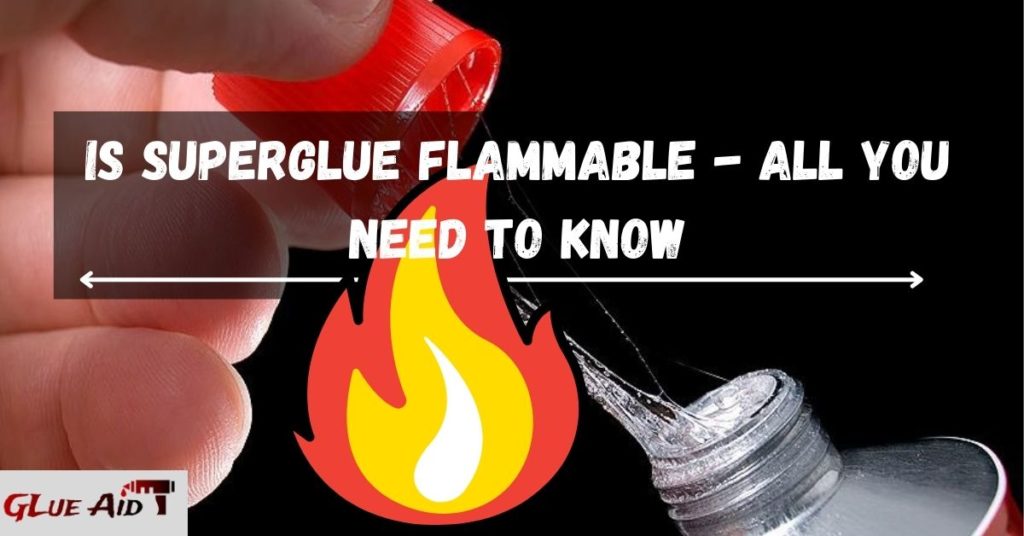Metal can be a difficult material to attach. One problem is that the two pieces may not be perfectly aligned, which can make it difficult to get a good bond.
Another problem is that metal can be very hard and brittle, making it prone to breaking or chipping. Sometimes a special adhesive is needed to attach metal securely. In this article we will guide you on does Super Glue work on metal or not?
Table of Contents
Does Super Glue Work on Metal?

The problem with attaching metal is that most adhesives don’t work well. Super Glue is one of the few that does, but even it has its limitations. It’s important to make sure the surfaces are clean and free of any oils or dirt before bonding them together. Super Glue also doesn’t work well on porous surfaces or on metals that are rusty or corroded.
The general consensus seems to be that Super Glue does work on some types of metal, but it’s not always effective. It all depends on the composition of the metal and how well the adhesive will bond with it. In some cases, the Super Glue will simply fall off after a short period of time.
How Well Does it Work on Metal?
Super Glue is a well-known adhesive that can be used to bond a variety of materials together. However, does Super Glue work on metal? The answer to this question is yes; Super Glue will bond metal surfaces together. In fact, the adhesive properties of Super Glue are so strong that they can even be used to join two pieces of metal together underwater.
While Super Glue will bond metal surfaces together, it is not always the best adhesive for this purpose. For example, if the metal surfaces are dirty or corroded, Super Glue may not be able to form a strong bond. Additionally, if there is a lot of movement between the two metal surfaces, the bond may eventually break.
How to Use Super Glue on Metal Effectively

Super Glue is a versatile adhesive that is often used to bond metal surfaces. In some cases, it can be difficult to get the Super Glue to adhere to the metal surface. However, there are several techniques that can be used to improve the bond and ensure that the Super Glue does not fall off.
One technique is to use a primer before applying the Super Glue. This will help to create a surface for the adhesive to adhere to. Another technique is to use a solvent such as acetone or alcohol on the metal surface before applying the Super Glue. This will help remove any grease or oils from the surface, which could interfere with the adhesive bond.
Finally, it is important to make sure that the surfaces are clean and free of any dust or dirt before gluing them together.
Testing the Adhesive Ability of Super Glue on Different Types of Metal
Super Glue is a household adhesive that is known for its ability to bond quickly and securely to a variety of surfaces. In this experiment, the adhesive ability of Super Glue will be tested on different types of metal.
The metals that will be tested are copper, aluminum, and steel. Each metal will be bonded with Super Glue and then allowed to dry for a few hours.
The strength of the bond will then be measured by applying a force to pull the two pieces of metal apart. It is hypothesized that Super Glue will form a strong bond with copper, aluminum, and steel.
Can Super Glue Work on Metal to Metal?

There are a variety of reasons why people might need to use Super Glue on metal. Maybe a metal part has fallen off a machine and needs to be fixed quickly, or maybe a metal tool has been misplaced and needs to be found. In any case, the question remains: can Super Glue work on metal to metal?
The answer is yes – but there are some things to keep in mind. For one, Super Glue will only stick to clean surfaces; if the metal is dirty or rusty, the bond will not be as strong.
Second, make sure that the two pieces of metal are properly aligned before applying the glue; if they are not, the bond will also be weaker.
Finally, give the bond time to set before using the repaired object.
Advantages of Using Super Glue on Metal
There are many reasons why people might want to use Super Glue on metal. One reason is that it can be a very strong adhesive. In fact, it is sometimes considered to be the strongest adhesive known to man.
This makes it a great choice for projects that require a lot of strength. For example, if you need to fix a broken metal object, Super Glue could be the best option.
Another advantage of using Super Glue on metal is that it can often create a watertight seal. This means that it can be used to waterproof metal objects or joints. If you have a leaky faucet or pipe, for instance, Super Glue could be the solution you need.
Lastly, Super Glue is also very easy to use.
Disadvantages of Using Super Glue on Metal
When it comes to adhesives, most people think of Super Glue. It is a great choice for bonding a wide range of materials, including metal. However, there are some potential disadvantages to using Super Glue on metal.
The first disadvantage is that Super Glue can be difficult to apply. It can be challenging to get the adhesive where you want it and ensure even coverage. If you’re not careful, you may end up with excess glue that’s difficult to remove.
Another disadvantage is that Super Glue may not be as strong as you need it to be. It can easily break or come loose if it’s subjected to a lot of stress or force. This can be a particular problem with metal, which is known for being strong and durable.
Finally, using Super Glue on metal can often result in a messy finish.
Tips for Using Super Glue on Metal
When it comes to adhesive strength, Super Glue is one of the best. It bonds quickly and strongly to a variety of materials. However, Super Glue is not always the best choice for metal surfaces.
Some metals are more difficult to glue than others. Steel, for example, is a challenging surface to bond with Super Glue. The surface must be clean and free of oils, waxes, or other contaminants for the adhesive to properly bond.
Super Glue can be used on metal surfaces, but it is not always as effective as other adhesives. If you are looking for a strong bond that will stand up to wear and tear, you may want to try an alternative adhesive.
Stay Safe When Gluing Metal
When using superglue with metal, carefully follow its recommendations. Whether it involves working in a large open area with a fan, or in a well-ventilated space with multiple windows, always follow the suggestions that the product comes with to stay safe.
If you’re outside, you can take advantage of air circulation in your workspace to reduce the fumes that you breathe.
You need to wash your hands after you are done working with any glue your little ones may have applied.
FAQs About Does Super Glue Work on Metal
What is the Best Glue for Metal?
The best glue for metal would be a type of adhesive that is specifically designed to bond with metal surfaces. This type of adhesive would need to be able to withstand the high temperatures and stresses that are typically found in metalworking environments. There are a number of adhesives on the market that meet these criteria, so it is important to choose the right one for the application.
Can Gorilla Super Glue be Used on Metal?
Gorilla Super Glue can be used to bond metal surfaces together, while in other cases it may not be effective. It is recommended that users test the adhesive properties of Gorilla Super Glue on a small, inconspicuous area of the metal surface before using it for a larger project.
How Strong is Super Glue on Metal?
When it comes to bonding metal surfaces, Super Glue is a very strong adhesive. It forms a durable and long-lasting bond that is resistant to both heat and humidity. In fact, the bond created by Super Glue is often stronger than the metal itself.
What Will Super Glue not Stick to?
Super Glue is a cyanoacrylate adhesive that forms an extremely strong bond with many materials. However, it will not stick to materials like Teflon or wax. The adhesive is activated by moisture and will form a bond very quickly, so it is important to be careful when using it. It is also important to note that Super Glue can be harmful if it comes into contact with the eyes.
How Do you Stick two Pieces of Metal Together?
There are a variety of ways to join two pieces of metal together. One common way is to use a welding process, which uses heat to melt the metals and then fuse them together. Another common way to join metals is with a mechanical fastener, such as a screw or bolt.
How Do you Make Two Pieces of Metal Stick Together?
There are a few ways to make two pieces of metal stick together. One way is to use an adhesive, such as epoxy or solder. Another way is to use a mechanical fastener, such as a screw or bolt.
How Long Does it Take for Super Glue to Dry on Metal?
Super Glue typically dries within minutes, but depending on the surface it is applied to, the drying time may vary. If Super Glue is applied to a non-porous surface such as metal, it will typically dry much more quickly than if it is applied to a porous surface such as wood. In some cases, Super Glue can even dry in seconds.
What is the Best Glue for Gluing Two Bits of Metal Together?
The best adhesive for permanently bonding two metal parts together would be a cyanoacrylate adhesive, such as Krazy Glue or Super Glue. This type of adhesive forms a bond very quickly as the molecules lock together, and it is resistant to both heat and solvents. However, it can be brittle and may not be suitable for all applications.
What Are Some Safe Ways to Remove Super Glue from Metal?
There are a few safe ways to Remove Super Glue from metal. One way is to use a product called Goo Gone. Another way is to use a product called WD-40. Both of these products can be found at most local stores.
Another way is to use a product called acetone. Acetone can be found at most local stores, but it is flammable and can be harmful if inhaled, so it should be used with caution.
Final Words
Super Glue can be tricky to use on metal. The fumes can be harmful, so it’s important to use caution when applying them. Make sure the surfaces you’re gluing are clean and dry and that the area is well-ventilated.
Related Resources:
- What Temperature Does Super Glue Melt
- Does Super Glue Work on Rubber
- Is Super Glue Conductive
- Is Super glue Waterproof
- Can You Use Super Glue for Fake Nails
- Why is Super Glue Age Restricted?
- How Long Does Super Glue Take to Dry
- Is Superglue Flammable
- Can You Super Glue Wires Together
- How to Fix a Hole in an Air Mattress With Super Glue
- How To Make Super Glue Dry Faster
- Nail Glue vs Super Glue
- What Happens if you Eat Super Glue
- How to Get Super Glue off Teeth




